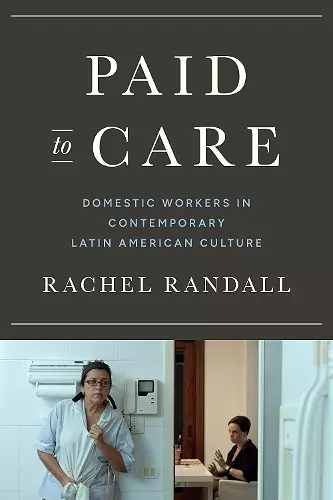Paid to Care
Domestic Workers in Contemporary Latin American Culture
Format:Hardback
Publisher:University of Texas Press
Published:23rd Jan '24
Should be back in stock very soon

An insight into the struggles of paid domestic workers in Latin America through an exploration of films, texts, and digital media produced since the 1980s in collaboration with them or inspired by their experiences.
Paid domestic work in Latin America is often undervalued, underpaid, and underregulated. Exploring a wave of Latin American cultural texts since the 1980s that draw on the personal experiences of paid domestic work or intimate ties to domestic employees, Paid to Care offers insights into the struggles domestic workers face through an analysis of literary testimonials, documentary and fiction films, and works of digital media.
From domestic workers’ experiences of unionization in the 1980s to calls for their rights to be respected today, the cultural texts analyzed in Paid to Care provide additional insight into public debates about paid domestic work. Rachel Randall examines work made in Brazil, Argentina, Chile, Mexico, Peru, and Uruguay. The most recent of these texts respond to the Covid-19 pandemic, which put many domestic workers’ health and livelihoods at risk. Engaging with the legal histories of domestic work in multiple distinct national contexts, Randall demonstrates how the legacy of colonialism and slavery shapes the profession even today. Focusing on personal or coproduced cultural representations of domestic workers, Paid to Care explores complex ethical issues relating to consent, mediation, and appropriation.
Insightful...Nuanced analysis. * CHOICE *
Marxists continue to state the theoretical mantra that so-called ‘reproductive labour’ is by definition already paid for in the wage earned by the worker as the return on labour power. Rachel Randall’s book about cultural representations of paid domestic workers in Latin America can be seen as a valuable contribution to this complex debate, by drawing attention to an equally uncomfortable theme for materialist analysis—human emotion. * Latin American Review of Books *
Randall’s book engages with previous research on marginality, class, and gender in Latin America and makes a significant contribution to the discussion of domestic workers’ rights, especially in light of her examination of rights that are not even spoken about by labor unions (such as: who has free time? what kind of family is a domestic worker supposed to have?). The book also makes a methodological contribution to the different forms of oral documentation (written, filmed, or virtual) and allows an enlightening discussion on the process of publication of others’ life stories […]. Randall allows us to look at both sides of the coin and examines, on the one hand, the intervention on domestic workers and the way their life stories are framed and told or filmed, and, on the other hand, the waves of influence of each publication of a life story in a film, testimonial book, or post on social networks. * EIAL *
This book is an important contribution to scholarly discussions around care work, paid domestic work in particular, and how these reflect perpetuating and unresolved societal inequalities and hierarchies. The author convincingly argues for focusing on representations in the cultural realm to better understand prevalent societal attitudes and dispositions towards issues that have been addressed legally yet not resolved. * Journal of Gender Studies *
[This book] is a must read...It is very well researched and offers lucid arguments that throw new light on a topic that hasn’t been adequately addressed. Randall leaves no stone unturned and clearly demonstrates how this inheritance from the colonial period continues to define our social relations in the home up to the present time. * Hispania *
ISBN: 9781477327708
Dimensions: 229mm x 152mm x 30mm
Weight: 626g
312 pages